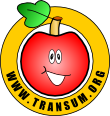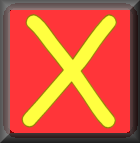
 |
Converting Standard UnitsConverting measurements of length, area, volume, mass and time from one unit to another. |
This is level 6; Digital. You can earn a trophy if you get at least 9 correct and you do this activity online.
The SI value (for example 1 kB = 1000 bytes) is used in these questions rather than the binary value. Click the Help tab above for more information.
InstructionsTry your best to answer the questions above. Type your answers into the boxes provided leaving no spaces. As you work through the exercise regularly click the "check" button. If you have any wrong answers, do your best to do corrections but if there is anything you don't understand, please ask your teacher for help. When you have got all of the questions correct you may want to print out this page and paste it into your exercise book. If you keep your work in an ePortfolio you could take a screen shot of your answers and paste that into your Maths file. |
||
|
|
||
|
|

|
More Activities: |
|
Mathematicians are not the people who find Maths easy; they are the people who enjoy how mystifying, puzzling and hard it is. Are you a mathematician? Comment recorded on the 9 May 'Starter of the Day' page by Liz, Kuwait: "I would like to thank you for the excellent resources which I used every day. My students would often turn up early to tackle the starter of the day as there were stamps for the first 5 finishers. We also had a lot of fun with the fun maths. All in all your resources provoked discussion and the students had a lot of fun." Comment recorded on the 19 November 'Starter of the Day' page by Lesley Sewell, Ysgol Aberconwy, Wales: "A Maths colleague introduced me to your web site and I love to use it. The questions are so varied I can use them with all of my classes, I even let year 13 have a go at some of them. I like being able to access Starters for the whole month so I can use favourites with classes I see at different times of the week. Thanks." |
Each month a newsletter is published containing details of the new additions to the Transum website and a new puzzle of the month. The newsletter is then duplicated as a podcast which is available on the major delivery networks. You can listen to the podcast while you are commuting, exercising or relaxing. Transum breaking news is available on Twitter @Transum and if that's not enough there is also a Transum Facebook page. |
|
AnswersThere are answers to this exercise but they are available in this space to teachers, tutors and parents who have logged in to their Transum subscription on this computer. A Transum subscription unlocks the answers to the online exercises, quizzes and puzzles. It also provides the teacher with access to quality external links on each of the Transum Topic pages and the facility to add to the collection themselves. Subscribers can manage class lists, lesson plans and assessment data in the Class Admin application and have access to reports of the Transum Trophies earned by class members. If you would like to enjoy ad-free access to the thousands of Transum resources, receive our monthly newsletter, unlock the printable worksheets and see our Maths Lesson Finishers then sign up for a subscription now: Subscribe |
||
Go MathsLearning and understanding Mathematics, at every level, requires learner engagement. Mathematics is not a spectator sport. Sometimes traditional teaching fails to actively involve students. One way to address the problem is through the use of interactive activities and this web site provides many of those. The Go Maths page is an alphabetical list of free activities designed for students in Secondary/High school. Maths MapAre you looking for something specific? An exercise to supplement the topic you are studying at school at the moment perhaps. Navigate using our Maths Map to find exercises, puzzles and Maths lesson starters grouped by topic. | ||
Teachers | ||
|
If you found this activity useful don't forget to record it in your scheme of work or learning management system. The short URL, ready to be copied and pasted, is as follows: |
Alternatively, if you use Google Classroom, all you have to do is click on the green icon below in order to add this activity to one of your classes. |
It may be worth remembering that if Transum.org should go offline for whatever reason, there is a mirror site at Transum.info that contains most of the resources that are available here on Transum.org. When planning to use technology in your lesson always have a plan B! |
|
Do you have any comments? It is always useful to receive feedback and helps make this free resource even more useful for those learning Mathematics anywhere in the world. Click here to enter your comments. |
||
© Transum Mathematics 1997-2026
Scan the QR code below to visit the online version of this activity.
https://www.Transum.org/go/?Num=520
These digital 'units of information' describe the capacity of standard data storage. You may have come across them when reading about the specifications of a computer or the speed of a wifi connection.
The basic unit is the byte (equal to eight bits) and is the amound of storage needed to store one character (a letter, punctuation mark or number).
The SI prefixes use powers of ten nearest the multiples of ten power of two of the binary values. The SI units make calculations much easier to do mentally.
| Symbol | Name | SI value | Binary value | Size difference |
|---|---|---|---|---|
| B | byte | 8 bits | 8 bits | |
| kB | kilobyte | 103 = 1000 bytes | 210 = 1024 bytes | 2.40% |
| MB | megabyte | 106 bytes | 220 bytes | 4.86% |
| GB | gigabyte | 109 bytes | 230 bytes | 7.37% |
| TB | terabyte | 1012 bytes | 240 bytes | 9.95% |
| PB | petabyte | 1015 bytes | 250 bytes | 12.59% |
| EB | exabyte | 1018 bytes | 260 bytes | 15.29% |
| ZB | zettabyte | 1021 bytes | 270 bytes | 18.06% |
| YB | yottabyte | 1024 bytes | 280 bytes | 20.89% |
Information from Wikipedia under the Creative Commons Attribution-ShareAlike License.
The SI value is used in the questions.
Don't wait until you have finished the exercise before you click on the 'Check' button. Click it often as you work through the questions to see if you are answering them correctly. You can double-click the 'Check' button to make it float at the bottom of your screen.
Answers to this exercise are available lower down this page when you are logged in to your Transum account. If you don’t yet have a Transum subscription one can be very quickly set up if you are a teacher, tutor or parent.
Close
